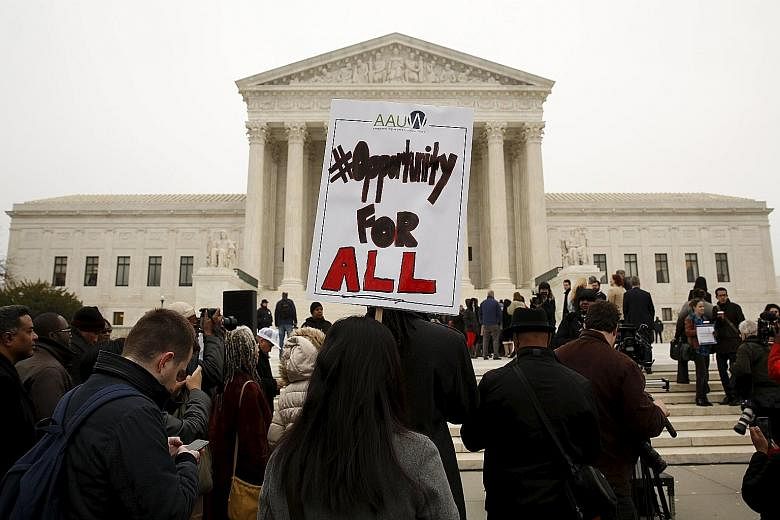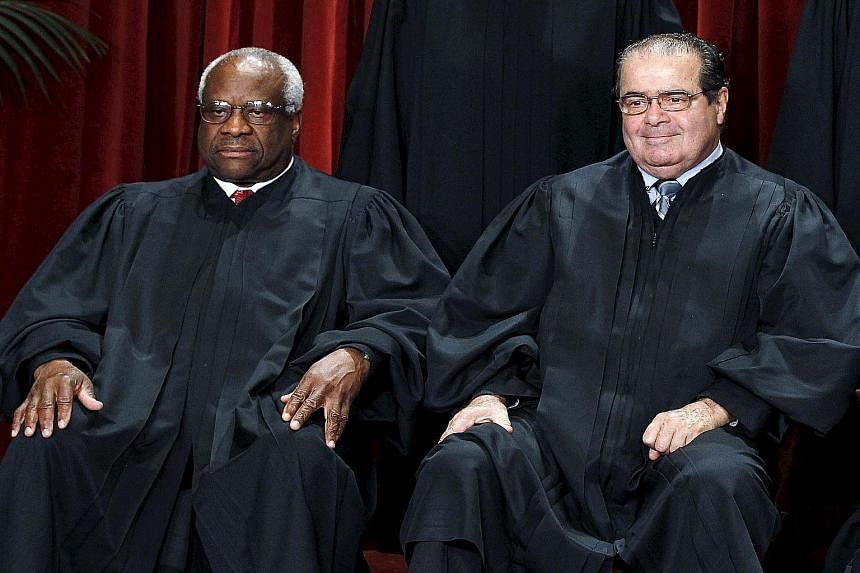WASHINGTON • In an awkward exchange in Wednesday's potentially game-changing Supreme Court arguments on affirmative action, Justice Antonin Scalia hesitantly asked whether it might be better for black students to go to "a slower-track school where they do well" than to go to a highly selective college, such as the University of Texas, through some form of racial preference.
Mr Scalia was addressing Mr Gregory G. Garre, the lawyer defending the University of Texas at Austin's affirmative action policy, which supplements the automatic admission of top-ranking students from all high schools across the state with the use of race as one factor in a "holistic" approach to admissions.
In asking such a question, Mr Scalia was stepping into a longtime debate over the so-called mismatch theory of college admissions.
Proponents of the "mismatch effect" say large allowances based on race are harmful to those who receive them, that students learn less than they would if they attended a college more closely matched to their level of academic preparation.
Critics say the mismatch research is based on flawed assumptions and evidence is more likely to show that all students benefit from enrolling at the most challenging college that will accept them.
In the current case involving the University of Texas - which could reshape the use of affirmative action in college admissions nationwide - the "mismatch" theory has been briefed on both sides, though it is not a central argument of either side, lawyers said.
In layman's terms, some see it as another form of the argument over whether getting a gentleman's C at Harvard is better for one's future than getting straight As at a lower- ranked university. "There's research finding that roughly half of government leaders and half of corporate leaders come from just 12 selective colleges," said senior fellow Richard Kahlenberg at The Century Foundation, who has studied affirmative action, on Thursday. "So clearly we want to try to find ways to provide access to those institutions for people from a variety of backgrounds."
But some activists said Mr Scalia seemed to be going beyond the mismatch argument to suggest that African-American students could not compete at top colleges. After his initial comment, he said maybe the university "ought to have fewer" blacks.
Senior counsel Rachel Kleinman for the NAACP Legal Defence and Educational Fund said Mr Scalia might have been disparaging the quality of historically black universities when he said "most of the black scientists in this country don't come from schools like University of Texas".
Mr Stuart Taylor Jr, who co-wrote the 2012 book, Mismatch: How Affirmative Action Hurts Students It's Intended to Help, And Why Universities Won't Admit It, said Mr Scalia's lack of eloquence had made what he said sound worse than it was.
Mr Taylor said the idea was not to reduce the number of black students going to college, but to admit them to schools where they would be more likely to succeed. "Martin Luther King didn't go to a fancy college. Thurgood Marshall didn't go to a fancy college. Colin Powell didn't go to a fancy college."
Mr Oren Sellstrom, one of the lawyers on a brief attacking the mismatch theory, called the theory paternalistic. "At root, (Mr Scalia) does not believe that students of colour belong at elite institutions. I hope that is not the case, but the tenor of the remarks certainly suggests that is underlying his thinking."
NEW YORK TIMES


